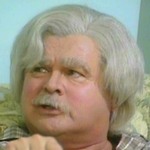
Alfred Hawthorne Hill
(21 January 1924 - 20 April 1992)
Left: This is certainly one of my favorite Benny characters and I hope one of yours, Benny as the old man himself in "Big Poppa".
Broadcast: March 25, 1981.
Jump to Part Three

Left: This is certainly one of my favorite Benny characters and I hope one of yours, Benny as the old man himself in "Big Poppa".
Broadcast: March 25, 1981.
I had written a tribute to Benny here quite some time ago, but it was brief and not very indepth. I decided that it needed to be revised and I could think of no one more capable than our own William Brown to do the job. He has also used some of the material I had written in the original in this new tribute. I have done the photos you see on these four pages as a Tribute to Benny's mastery of so many characters during his twenty years at Thames Television. Hopefully fans will see this as a fitting Tribute to Benny. For a more indepth look at the characters that Benny did over the years, check out the Faces of Benny Hill Pages.
Pop-Up Gallery | Non Pop-Up Gallery
This gallery includes segues from the Crazy World Of Benny Hill. The photos and text for the gallery were put together by William Brown. In order to accomodate those who do not have Pop-Up Support in their browsers, there are two links for each gallery. The Photos in the gallery are 500 pixels wide by 357 pixels high.
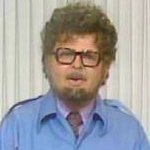
Benny as Rolf Harris in "The Art of Rolf Harris"
Broadcast: March 12, 1975
Meanwhile, his run with his new home led off with a bang, when his Nov. 19, 1969 special finished #1 in the ratings for the week. (That show was the final piece of the puzzle to his Thames years that began to be put together many years before, as a ditty co-written and originally performed by Boots Randolph, "Yakety Sax," made its first appearance on the show; though a hit in the U.S. in late 1962 / early 1963, it didn't chart at all in Britain on its original release.) Most of his specials through the first half of 1980's made the Top Ten, with a dozen or so more hitting #1 on its original airing. His formula in the early years was: a quickie, a song, depictions of things that go wrong on television (known these days as "bloopers"), interview sketches, a musical number or two, usually from The Ladybirds but sometimes from "another" musical guest, a silent filmed sketch, and a big finish. And in the early years especially, it was a winning formula. His March 24, 1971 show was seen by a staggering 21.63 million viewers, the highest he ever attained (though he would come close in later years - a far cry from his BBC days where his specials only occasionally made the lower rungs of the Top 20). In 1972, Benny won a BAFTA award for Best Script; the two producers of his 1971-72 series, David Bell and John Robins, won for Best Light Entertainment Production. (The show also received BAFTA nominations in 1971 and 1975.) TBHS also took home the "Silver Logie" for "Best British Show" at the 1974 Logie Awards.
Also, from 1975 to 1981 Mr. Hill was the subject and focus of a weekly comic strip, "The Benny Hill Page," that was featured in the British children's magazine Look-In, which had a section called "Junior TV Times" where children's programmes on ITV (including The Six Million Dollar Man, Space: 1999 and Buck Rogers in the 25th Century) were spotlighted. The logo panel had a photo of Benny from his Dec. 5, 1973 "Fun at the Flicks" sketch. Different characters of Benny's were spotlighted in these comic strips, including Fred Scuttle, Ernie the milkman, and a few other "Cousin" characters that may or may not have been based on unnamed characters he played in the various quickies, sketches and/or poem segments on his specials. "The Benny Hill Page" ended around the time Look-In revamped its look and switched from using oil paintings to photographs on its covers - and at the same time as Mr. Hill was beginning to be embroiled in a quagmire of controversy over the then-increasingly sexualized content of his show.
Like other ITV programmes on the air in 1970-71, Hill's show was affected by a strike called by ACTT which lasted from Nov. 13, 1970 to (approx.) Feb. 11, 1971. The strike was for higher pay for technicians who adjusted the color cameras that had been in use since 1969. Three of Hill's shows - Dec. 23, 1970, Jan. 27, 1971 and Feb. 24, 1971 - were therefore produced and aired in B&W. Because the shows as a whole remained unseen in the U.S. until the DVD releases of his entire shows, many misconceptions about what was and wasn't seen lingered for years. One, for example, had his "Ernie" song (more about which below) as aired on his Jan. 27, 1971 Top of the Pops parody, rather than his Dec. 23, 1970 Opportunity Knocks takeoff from which it actually originated. (Future singing star Kiki Dee appeared on the second of these affected shows.) It had also long been asserted that absolutely nothing from these three shows were ever seen again, although the Jan. 27, 1971 special yielded the period French-derived farce "Love Will Find a Way" which appeared in the 1974 compilation film The Best of Benny Hill and among the half-hour U.S. syndicated episodes, albeit in sepia tone. (Conversely, it was unclear until such DVD releases that the B&W sketch "Wind of Change" was actually from the Oct. 28, 1970 show which, apart from that one sketch, was in color.) Because the B&W episodes weren't included in the package apart from that one skit, many sketches and quickies from these shows would be remade or refashioned within his last ten years with Thames.
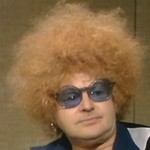
Benny as Tex Cymbal in "Tex Cymbal: Golden Boy"
Broadcast: September 24, 1975
In addition, the 1970-71 series marked a departure in that Hill, in at least the first four shows of the series, attempted to handle location shooting on videotape rather than film. Whatever the reason - cost, the lack of flexibility of outdoor videotaping of the time, the aforementioned labor strife - he resumed using film for outdoor inserts effective with his March 24, 1971 special (though the above-mentioned "Love Will Find a Way" also was filmed). He made one more concentrated attempt to do taping on location with his May 30, 1978 special, though part of the "Cops and Robbers" sketch of Feb. 10, 1982 appeared to be also videotaped at the start.
In the early years especially, there was more of a diversity of casts from show to show, in part because in the early years, all elements of the show - outdoor filming, taping of quickies and other sketches which required (for example) Benny to play two roles in one camera shot, "audience night" moments such as his opening songs, his interview sketches and such - were handled invididually for each show, in marked contrast to the later years where filming for an entire series of shows was done in one big concentrated period, taping of quickies and "special sketches" likewise done in one big chunk, and the casts were more or less standardized from one show to the next. Meaning that one show would first film, then tape, then do "live" bits, then the next show would start filming and the cycle would begin again. It was in these years that he began to rely on an amazing cast of regulars, with some of them becoming as famous as Mr. Hill himself. His show became his world and the studio his playground. He was a perfectionist, often requiring up to 30 takes for one scene to "get it right"; many cast members have described him, with a few variations in characterisation, as a "hard taskmaster," though he was equally demanding of himself. Those who worked on his show in the first half of his Thames run often spoke of a different atmosphere on the set than that which characterised the second half of his association with the company. Often, when his patience while waiting for things to come together was being tested to the limit, he would whistle "If It Takes Forever," during which times cast members knew to stand out of the way. He was also very big on props, detailing to the very last 16th of an inch how long a stairstep should measure, for example. This aspect, plus his various disguises and makeup (as well as wigs and sometimes mustaches and beards) needed for his different impressions, would in time lead to his show being one of the highest-budget - and highest-maintenance - programmes on television. In his first decade with the company, he went through producers and directors at a rapid pace; aside from the aforementioned Mr. Robins and Mr. Bell there was Peter Frazer-Jones (later to helm Man About the House which would be the basis for the U.S. sitcom Three's Company) who lasted only one show; three other producer/directors had two runs each with the programme.
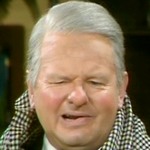
Benny as W. C. Fields in "Film Time: Director Sam Speiler"
Broadcast: Feb. 7, 1974
His Thames association also restarted his recording career. In 1971 he had what turned out to be his biggest hit with "Ernie (The Fastest Milkman In The West)," which he'd performed the year before on one of his B&W shows, a programme which featured two other tunes - "Broken Hearted Lovers' Stew" and "Rachel" - that were included on an album, Benny Hill: Words and Music, later repackaged in such configurations as Benny Hill Sings "Ernie" and This Is Benny Hill. ("Ernie" was released at the time as a single in the U.S. on Capitol 3272 and in Canada on Capitol 72659; in both countries, the song was a flop, and such copies are prized collector's items today, more so than the British release.) Side one consisted of special recordings of his more recent songs, dating back to "Ting-A-Ling-A-Loo" from the very first Thames show; side two featured audio samples of his poems and interview sketches. One of the tracks, "Interview (Featuring Lesley Goldie)," was the only other routine from his B&W shows to have been available for years (after the "Love Will Find A Way" sketch); in this case, from the Feb. 24, 1971 "Uplift With Humphrey Bumphrey" sketch. Alas, one more single - "The Dustbins Of Your Mind" / "Fad Eyed Fal" (both from his Oct. 25, 1972 special) - tanked, thus ending his recording career for the next two decades.
During this period, the media was all abuzz with talk of the "sexual revolution," with "hot pants" being among the main fashions of the time, the British tabloid The Sun began what became a long-standing tradition with their "Page 3" section, and men's magazines such as Mayfair were beginning to penetrate the public consciousness. (Ironically, some of the girls who appeared in the pages of the aforementioned venues would appear on TBHS down the road.) Here again was where Benny's predilection for following the latest trends in pop culture took hold - and in so doing, began courting controversy. Hill also appeared to be following developments elsewhere in British television, where other comedy shows (such as the aforementioned Monty Python's Flying Circus) were pushing the envelope with regularity and testing the limits of what could be shown and said on TV. In those years, he was especially on the lookout for the "naughty" and "sexy" jokes, which would become extremely difficult for him in the later part of his career. Progressively, the women on the show became more scantily-clad, with bras, stockings and suspenders becoming the main "de rigueur" dress code. Though at first the girls, while considerably pretty, essentially took a back seat to the comedy, the day would be fast approaching when it would be the other way around, with the ramifications being especially far-reaching.
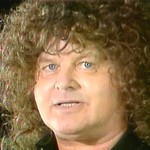
Benny as Bob Dylan in "Benny's Ballad: Go 'Round Again"
Broadcast: Dec. 26, 1978
But it was during the first half of the '70's that many a fan favorite moment originated: his recurring "blooper" sketches; interviews with such characters as Fred Scuttle, Mervyn Cruddy and Chow Mein; his slice-of-life poems with particular emphasis on his knack for wordplay (one of the most famous, from its inclusion in both film and record, being "The Birds and the Bees" from the March 11, 1970 show); his parodies of TV shows of the day, both British and U.S.; and his impersonations of various figures from the arts, music, TV, film and sometimes politics and sports. Some of his fast-motion silent sketches, such as "The Messenger" (March 24, 1971), "Woodstick" (Oct. 25, 1972), the "Fred Scuttle's Channel Tunnel" and "The Great Britsh Dancing Finals" sketches (both from Dec. 27, 1973), "Match of the Week: Golden Goalies and Their Silver Saves" (March 13, 1974) and his Kung Fu spoof, "Behind the Bamboo Certain" (March 12, 1975) are certified classics today. Nine of the first eleven TBHS editions that were helmed by John Robins (aired between Nov. 19, 1969 and March 22, 1972) formed the basis for the feature-film compilation The Best of Benny Hill, released in 1974 and edited between the production of his Feb. 7, 1974 and March 13, 1974 specials; the production of this film had more in common with the 1973 feature Ten from Your Show of Shows (derived from the 1950-1954 U.S. TV series which made household names of Sid Caesar, Imogene Coca and Carl Reiner; the release of which inspired Hill to put out his film) than with the Monty Python troupe's 1971 movie And Now for Something Completely Different in which they performed new versions of sketches that had previously appeared on their television show, whereas TBOBH used the original source film of his outdoor-filmed sketches, and color kinescopes of his videotape-based moments. (He also had a poster for ANFSCD posted on the wall in his Feb. 22, 1973 "Shakespeare on the Phone" sketch.)
Cast and crew members, large and small, noted that Mr. Hill's writing process was rooted in several different directions and sources: ideas from key players on his show; brainstorming sessions; lifting from other comedy sources, whether live action, stand-up or animation (in that respect, he was not too dissimilar to Milton Berle, "The Thief of Bad Gags"); recycling routines he had written many years before, either alone or in tandem with Dave Freeman; watching TV and, in later years, recording off of TV (in his final years, his home had a couple of TV's and some VCR's); and so forth. He would often write on cardboard shirt stiffeners, napkins or other paper stuffs and send them to his production staff who would then spin a full script from his motley notes. Some people who worked on the show noted that Hill would often change a gag midway through filming or taping depending on certain variables, i.e. the actor, the weather or other circumstances. While his cast and crew became his pillars in the studio, he was never too comfortable with strangers; in the last years, he would film ending chase sequences at an amusement park located in Surrey, England, with certain sections closed to the public whenever Benny and company filmed.
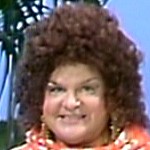
Benny as Cleo Laine in the "Musical Favorites" Opening
Broadcast: April 25, 1979
Throughout his career, he maintained perfect musical pitch, with an ear for different sounds, whether at home or abroad; he played the guitar and wrote many songs, as noted above (though in certain sketches he and some of his cast had covered from the proverbial "Great American Songbook," with the works of such composers as Cole Porter, Irving Berlin, Rodgers & Hammerstein {and their respective prior collaborators, including Lorenz Hart and Sigmund Romberg}, Warren & Dubin, Martin & Blane, Nacio Herb Brown, Gus Kahn, and others being performed on the show over the years).
Benny's impresario side also reared itself often during this period. While on holiday in Spain he attended a show headlined by a British-born performer then living and working in Madrid, Diana Darvey. She made her TBHS debut on Feb. 7, 1974 and made an immediate splash with her self-designed wardrobe, her musical numbers and her unique presence, appearing in four more shows up to 1977 and parlaying her success into appearances on such shows as And Mother Makes Five and Quick on the Draw, and the 1975 film Carry On Behind. It wasn't just the girls, though; from 1975 to 1977 Hill gave regular exposure to a budding MOR singer named Eddie Buchanan. But another of his "discoveries," to be mentioned later, would go even further than any of the above.
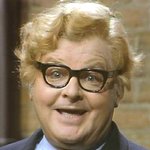
Benny as Michael Caine in "Not A Lot Of People Know That"
Broadcast: January 7, 1981
Up to his first decade or so with Thames, Benny sought to keep a slim, trim figure to project a lean, mean, fighting comedy machine on television, which was real hard in his case given his propensity for food in the "off-seasons." As his future producer/director, Dennis Kirkland, noted in his memoirs detailing his long association with the comedian, Hill would often take diet pills (which Kirkland categorised as "speed") in a bid to keep his weight under control. The effects of such pills may have contributed to a benign tumor in one kidney which, in 1976, led to such a kidney being removed. (He would also have other health problems in later years, including a recurring ulcer after 1983.) As the '70's gave way to the '80's, it became even harder to keep off the pounds and as the '80's wore on, his weight gain became even more noticeable.
As the '70's were winding down, changes were afoot on the show. In 1976 and 1977, he had on a group of girls called "Love Machine," originally a quartet but in their final appearance on the show expanded to a quintet. Two of the members of the troupe would figure heavily in the direction of TBHS in later years; and these were the first tentative steps to the direction the programme would eventually take. His "blooper" quickies were becoming less frequent - like many other formulae on his show, it was susceptible to individual bits being repeated over and over again - and the proverbial nail in the coffin in those bits may have come in 1977 with the first of many specials aired under the title of It'll Be Alright on the Night, which gave the British public the first chance to see what actually went wrong on TV and in the movies, rather than the staged depictions of outtakes as offered by Mr. Hill. After a few bits here and there, he finally brought his "Benny's Bloopers" segments to an end after the April 25, 1979 show. And a taste of the future controversies that would embroil his show in its final years came during the making of the Dec. 26, 1978 show, when four dancers in the "Sam's Set" dance troupe which were appearing on that edition drew the line on wearing the more revealing clothing that was also beginning to be seen on the show, making headlines in the process. A point towards the future came with the first two shows of the 1977 series, when he first had on his show a young actress/dancer who would become a major part of the programme in its final years, both as a Hill's Angel and as a comic performer: Sue Upton.
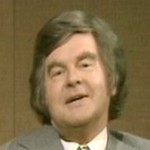
Benny as Michael Parkinspace in "Tex Cymbal: Golden Boy"
Broadcast: September 24, 1975
In 1977, Benny made a special in Australia, working with an all-Australian cast (including Ron Shand, Max Phipps, Barry Otto, Jimmy Clifford, Victoria Quilter and Lorna Lesley) and crew out of TEN10 Sydney, part of what would later become Network Ten; the resulting special, aired there as Benny Hill in Australia and in Britain the following spring as Benny Hill Down Under, was as explicit as he ever got, with outright nudity seen briefly during the course of "The True Story of Benny Kelly, Outlaw" sketch. The show also featured such fan favourites as "Hold Back The Wind" (with Benny as a Southern "Big Daddy" character bellowing, "Cut out the middleman! That's how I made my money - by cuttin' out the middleman!"), the old bit (previously done on stage in Fine Fettle and one of his 1967 ATV Spotlight episodes) about two stable boys tending to Lady Godiva's horse, and his TV spoof Archie's Angels. Though segments from this show later would be included in U.S. syndication, and also featured in the home video compilation Benny Hill's Video Sideshow (originally released as The Best of The Benny Hill Show, Vol. 3), the complete programme, as of January 2007, has not been released in its entirety on DVD either in the U.S. or Britain.
Continue on to Part Four